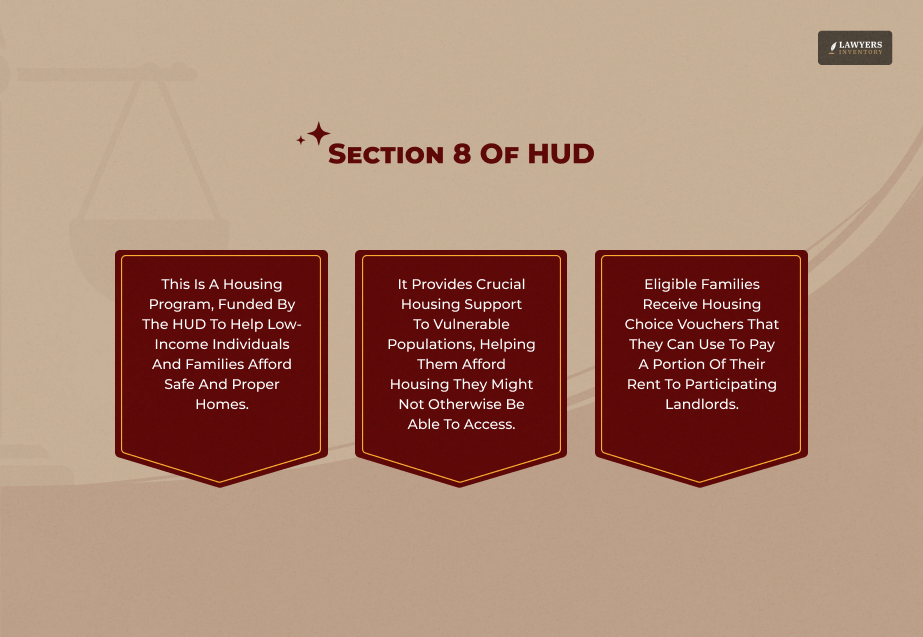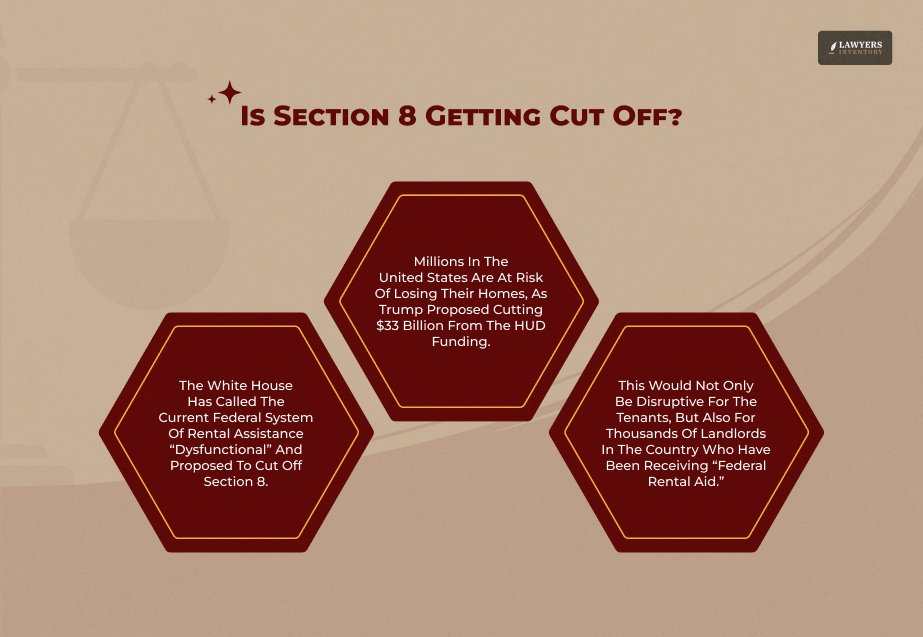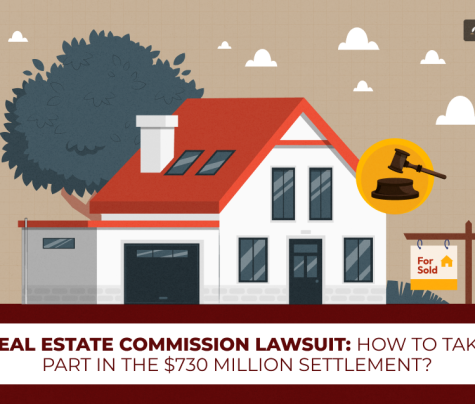
- About 1.4 million people in the United States are currently at risk of losing their homes as Trump proposed cutting $33 billion from the HUD funding in his budget plan for FY 2026.
- The White House has called the current federal system of rental assistance “dysfunctional” and proposed to cut off Section 8, ending the Housing Choice Voucher Program.
- According to NPR, this would not only be disruptive for the tenants, but also for thousands of landlords in the country who have been receiving “federal rental aid” because of Section 8 of the HUD.
The Housing Choice Voucher Program, commonly known as Section 8, is a critical lifeline for approximately 2.3 million low-income households.
But recent budget proposals, workforce reductions at the U.S. Department of Housing and Urban Development (HUD), and looming federal funding deadlines are creating dangerous uncertainty.
Renters and housing providers alike are wondering: Is Section 8 getting cut off?
And considering the fact that most of the people who get aid from the voucher program are low-income households, this fear of how the families are going to function once the scheme gets cut off is only natural.
If that’s what you want to know about, then you have come to the right place. Therefore, keep on reading this blog till the end and thank me later…
What Is Section 8 And Why Does It Matter?

Established under Section 8 of the Housing Act of 1937, this is a program that helps low-income families, the elderly, and disabled individuals afford a house in the private housing market. The Department of Housing and Urban Development (HUD) subsidizes the rent directly to participating landlords.
Ever since its enactment, this has considerably saved a lot of families in the housing market from facing eviction. For instance, as per data, in the year 2022, “about 2.3 million out of the 5.2 million households receiving rental assistance used Section 8 vouchers.”
Till date, it remains the largest federal assistance program for low-income renters. However, irrespective of such a data, it still only reaches about one in four eligible households due to funding limits.
While the HUD is the main governing body that oversees the entire housing voucher program, the regular administration lies with the local public housing agencies.
Beyond eviction prevention, Section 8 promotes housing stability, offering recipients mobility and independence. However, navigating long waitlists (some stretching beyond a decade) and landlord resistance in the housing community remain persistent challenges.
Proposed Cuts And Policy Shifts In 2025: Is Section 8 Getting Cut Off?

On many occasions, President Trump has assured the public that he would bring America back to being affordable. However, the new budget plan of his administration is going to reduce the federal rental aid by a large margin.
And considering it is a major source of rental homes for millions of people, most people are worried about whether Section 8 is getting cut off.
According to reports from NPR, the White House, in its demand for the HUD, labeled the existing federal rental assistance program as “dysfunctional.” Additionally, it suggested the abolition of Section 8 and all other housing voucher programs.
Their plan proposes cutting the rental aid by almost 40% and reallocating the savings to the states to allow them to develop their own rental assistance programs that would better suit their preferences.
AP News states that the “proposed changes include a two-year limit on the federal government’s signature rental assistance programs.”
In one of its budget hearings, Scott Turner, the HUD Secretary, mentioned that with policies like time limits, the government will be able to fix “fraud in public housing.”
Here are a few things that are fueling the fear in public:
- Deep Budget Cuts: The Trump administration’s FY 2025/2026 proposals would slash HUD funding by up to 43–44%, including about $26.7 billion in rental assistance reductions.
- Block Grant Shift: The federal government would transition Section 8 and related programs into state-run block grants—reducing federal oversight and uniform eligibility standards.
- Time Limits on Aid: Able-bodied adults without disabilities could be capped at two years of rental assistance. This would mark a shift from indefinite aid to a temporary model.
- HUD Layoffs and Agency Instability: Proposals to cut HUD’s workforce by up to 50% threaten administrative capacity, slowing voucher issuance and program oversight.
Consequences Of Section 8 Cuts
Deborah Thrope is the deputy director of the National Housing Law Project. While talking to Bloomberg, she rightly points out that the local housing authorities that operate the housing vouchers have been working with very tight budgets.
This has primarily been due to the absence of a cost-of-living allowance in the current continuing resolution, which funds the federal government.
And considering the fact that they have fewer “healthy reserves…any budget impasse will mean they’ll be forced to curtail the support services they run for tenants.”
The immediate impact of the Section 8 cuts includes the following:
- Voucher Suspensions: Housing authorities may stop issuing new vouchers; some are already doing so.
- Reduced Subsidy Levels: Agencies like Los Angeles have already reduced subsidy levels for new agreements as of August 1, 2025.
- Service Cutbacks: Administrative funding drops could limit supportive services and slow response times.
On the other hand, when it comes to the long-term ramifications of this plan, here are some of the things that you need to keep in mind:
- Housing Loss: Families—especially renters with children—risk eviction once aid runs out.
- Rising Homelessness: Reducing vouchers will likely increase homelessness, counteracting HUD’s own metrics showing a sharp rise in need.
- Stress on Housing Market: According to reports by the Wall Street Journal, this increases the risk for landlords, lenders, and investors who rely on HUD-backed revenue streams in the market.
- State Readiness Questioned: Critics doubt state systems can handle demand or afford equity in assistance.
Is Section 8 Getting Cut Off? What Renters And Landlords Should Know!
While it is true that people have been questioning whether Section 8 is getting cut off, this supposed change has already started affecting the housing market.
FingerLakes1 points out that, as a result of the reduction in HUD’s 2025 budget, the housing agency has decided on a few things:
- Issuing a smaller number of new vouchers.
- Stricker policies related to recertification.
- A reduction of funding for the local housing authorities.
Apart from these, here are a few things that the renters should know about:
- Voucher Validity: Benefits are still active, but new issuances may be delayed. Therefore, stay in touch with your local housing authority.
- Documentation Matters: Keep all compliance and recertification paperwork ready, as agencies may tighten scrutiny.
- Support Services May Shrink: Expect fewer support services, like job training or counseling. So plan ahead.
And if you are a landlord, there are primarily two things that you should know about. They are:
- Payment uncertainty.
- Alternate options.
For instance, as a landlord, you must understand that the HUD payments are up for now. However, there can be delays in the future. Additionally, it is best that you know your other options. You can consider shorter leases or private rental assistance funds as backups.
In conclusion, the government has not “cut off” Section 8 – yet.
But with aggressive budget proposals, looming policy shifts, and administrative instability, millions of Americans are facing one of the most precarious periods in the program’s half-century history.
Therefore, renters, landlords, and providers must stay vigilant and united as their housing stability depends on it.
Read Also:
- Section Officers in the US: Clerical Job or a Powerful Position?
- What Is MODT And What Is The Process Of MODT?
- What Proof Do You Need for a Restraining Order?











0 Reply
No comments yet.